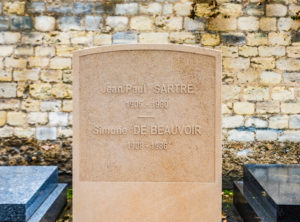
French philosopher, Jean Paul Sartre, was a prisoner of war under Nazi Germany during World War 2.
He said he learned to be happy by controlling his behavior on a second by second basis. By merely deciding to lift his index finger a slight bit while standing at attention, he said a feeling of happiness came over him.
When I first read this, I didn’t understand the idea Sartre was trying to communicate. So I decided to put his idea to the test by acknowledging and focusing on the smallest thing that caught my eye. For example, there is a French Provincial style home that fronts our backyard. I’ve been looking at that home for thirteen years. For some reason a particular angle on its roof line caught my attention. I focused on it, instead of looking at the home as a whole.
As I did, a sense of appreciation entered my mind. It was a beautiful angle, cut to precision to fit the two end pieces together. Its color tone fit the angle, and the angle reminded me of beautifully architected homes I’ve observed over the decades in France.
(Privately, I made a promise that I would never tell this story to my children, because that would have given them the excuse to put me away. So, you ask, why am I sharing the story right now? Because I know you’ll never read this, and I’m positive my children won’t.)
It sounds weird to me that I got caught up in an angle on the side of the home, because I’m not accustomed to dwelling on details like that. Maybe Sartre had something, I thought to myself. So I tried another experiment. I went into an extra bedroom on the upper floor of our home. I pushed the curtains back, pulled up the wooden slatted blinds, brought in a chair, and looked out over the valley. A pillowy white cloud caught my eye. Instead of taking in the full valley at one glance, I concentrated on that cloud. I didn’t ask myself when the cloud would pass away, I didn’t asked what weather the cloud would bring. I just enjoyed the beautiful tones reflected off of it from the sunlight. It was a nice moment of peace I could actually feel through out my body. No kidding, this really, really happened.
(If you are perceptive, which you are, you might think that I’m so unhappy that I talked myself into being happy by looking at a cloud. Perhaps, who knows?)
Back to Sartre. Maybe he was right. No matter what surrounds you – good, bad, or indifferent – the mind’s eye can capture something worth deciding to treasure, even if it is merely deciding to lift your index finger, while being held captive by enemy soldiers.